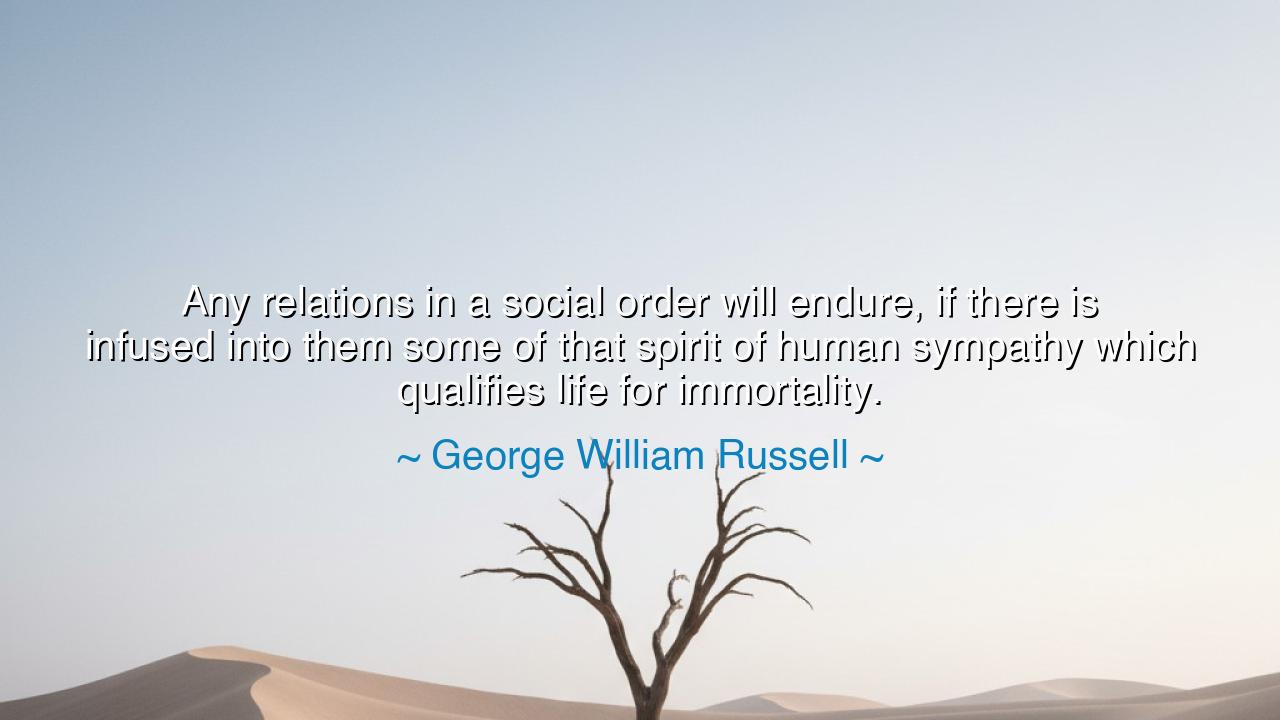
Any relations in a social order will endure, if there is infused
Any relations in a social order will endure, if there is infused into them some of that spirit of human sympathy which qualifies life for immortality.






"Any relations in a social order will endure, if there is infused into them some of that spirit of human sympathy which qualifies life for immortality." These profound words from George William Russell speak to the timeless truth that the enduring strength of relationships, whether personal, social, or even political, lies not in structures or systems, but in the spirit of human sympathy that binds them. Russell highlights the power of compassion and empathy in forming connections that transcend the fleeting nature of time and endure through generations. It is not enough to merely exist within a society or a relationship; what truly sustains it over time is the genuine care, understanding, and love that individuals bring into their interactions with one another.
Consider the example of the great civilizations of antiquity, such as Ancient Greece or Rome, which flourished not merely because of their laws or military power, but because they built communities rooted in shared values and sympathy. Socrates, one of the most revered philosophers in history, is remembered not just for his intellectual contributions but for the deep empathy he showed toward his students and the humanity he brought to his philosophical method. His approach to life was one that encouraged a deep connection between individuals, where respect and understanding formed the basis of a stronger and more enduring society. Through his relationships, the wisdom he imparted was not confined to his time but has endured for centuries.
Russell's words call us to reflect on the nature of the relationships we form in our own lives. It is easy to focus on the surface—on the social roles we play, the titles we hold, or the appearances we maintain. But Russell reminds us that what truly sustains these relationships, what makes them last through time, is not the outward structure or the benefits they bring, but the spirit of sympathy with which they are infused. This spirit is what elevates relationships from mere transactional interactions to something deeper—something that has the potential to last forever, transcending the bounds of life and death, echoing in the memories of those who come after us.
The immortality Russell speaks of does not refer to physical survival but to the legacy of relationships built on love, care, and compassion. In every culture, from the ancient Egyptians to the Chinese dynasties, stories of great leaders and figures are often remembered not for their wealth or power, but for the relationships they cultivated—relationships that were rooted in a sense of shared humanity and a commitment to the welfare of others. Confucius, for example, is not just revered for his teachings on ethics, but for the deep sympathy he showed toward his disciples, imparting wisdom that formed the basis for centuries of social harmony in East Asia. His belief in the importance of kindness and the value of human connection made his legacy one that transcended his physical life, as his influence is still felt today.
Similarly, we look at the civil rights movements of the 20th century, where figures like Martin Luther King Jr. carried a message of empathy and love for all people, advocating for equality and justice not through violence or hatred, but through understanding and nonviolent resistance. King’s ability to inspire change came not just from his eloquence or his vision for a better world, but from the spirit of sympathy he infused into his relationships with others, regardless of race, class, or background. His vision for a beloved community was based on the belief that human connection, rooted in love and empathy, was the key to social progress, and this belief has ensured his legacy endures long after his death.
The lesson embedded in Russell’s words calls us to examine how we approach our relationships—whether with family, friends, colleagues, or even strangers. It challenges us to cultivate not just transactional connections, but relationships that are grounded in genuine care, understanding, and mutual respect. True immortality is not achieved through fame or fortune, but through the lasting impact we have on others by infusing our interactions with the spirit of human sympathy. This is what makes our relationships meaningful, and it is this spirit that ensures they endure, not just in this lifetime but in the memories of others long after we are gone.
In practical terms, Russell’s insight asks us to commit to being present and compassionate in all our interactions. We must focus less on the superficialities of social dynamics and more on the deep, meaningful connections that are formed when we listen, empathize, and show genuine concern for others. Whether in our family, workplace, or community, let us take the time to build relationships that transcend transaction and become grounded in human empathy. By doing so, we create a foundation for lasting impact, one that not only improves our lives but also leaves a legacy of love and sympathy that will endure through the generations.
Thus, let us heed Russell's wisdom and strive to infuse every relationship with the spirit of human sympathy. In doing so, we will not only find fulfillment in our lives but also contribute to the greater good, leaving a legacy that is timeless—one that transcends the boundaries of mortality and lives on in the hearts and minds of those who come after us. Immortality, in this sense, is not an abstract ideal, but a living, breathing force that shapes the world we leave behind.






AAdministratorAdministrator
Welcome, honored guests. Please leave a comment, we will respond soon